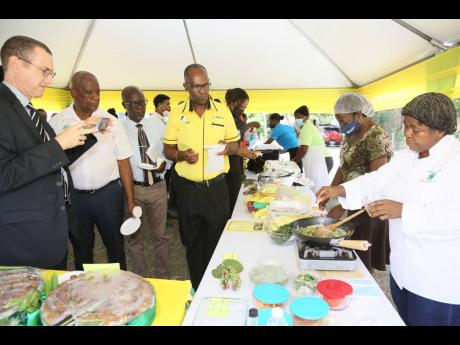Young farmers get impetus from agriculture programme
Some 600 youth farmers, last Thursday, were named beneficiaries of the Strengthening the Adaptive Capacity of Young Farmers and Fisherfolk project, an initiative geared towards offering support to youth in agriculture to combat climate change and natural disasters.
The $21-million project, funded by Global Affairs Canada and the Foreign Commonwealth and the Development Office (FCDO) in the United Kingdom, was launched at the Denbigh 4-H Clubs Training and Production Centre, at the Denbigh Agricultural Showground in Clarendon.
A pilot project, EnGenDER – Enabling Gender-Responsive Disaster Recovery, Climate and Environmental Resilience – was also launched by UNDP Resident Representative Denise Antonio.
The EnGenDER project is geared towards affording equal opportunities to farmers. According to Antonio, a gender-equal approach integrating youth, women, men, disabled people, and other groups at risk of being left behind, will maximise the resilience and productivity of Jamaica’s fisheries and agricultural sectors.
In a virtual presentation, Antonio said, “Fishers and farmers play a vital role in food security. But there are current imbalances that can limit their potential contributions to growth,” adding that only 20 per cent of farmers are young people age 18 to 35, with only 31 per cent of youth farmers being female.
“In the fisheries sector, this is further reduced to 5.9 per cent. The inequalities run deeper than participation, they also touch on access. In the crucial period following a disaster, women face greater challenges in accessing resources for recovery. The numbers are clear. We need more young people, and more young women, to participate in these sectors,” Antonio said.
“We need to ensure the playing field is level for all to access capital and support for resilient livelihoods and recovery in the event of a climate-induced disaster. We need greater investments in gender-sensitive resilience programming to strengthen Jamaica’s climate resilience.”
KEY PRODUCTIVE SECTOR
Antonio cited the agriculture as one of Jamaica’s key productive sectors, and added that the sector is also one of the most vulnerable to the effects of climate change and natural disasters.
“The work to be undertaken holds much promise for transforming our beneficiary communities, particularly the youth. [The] results will directly contribut to Jamaica’s National Development Plan, Vision 2030, and the achievement of the Sustainable Development Goals,” said Antonio.
Keneil Morgan, one of the beneficiaries, told The Gleaner that the programme will positively impact his aquaponics and hydroponics business.
St Thomas bee farmer Daniella Williams said: “What I’m looking forward to is some more input in my beekeeping enterprise. I got some experience, and the training helped me a lot in marketing because I’m now doing a lot of social media marketing, so I’m looking forward to increasing my bees.”
The project will be implemented by the Jamaica 4-H Foundation, and directly aligns to the 4-H Clubs’ Youth in Agriculture Programme in the Ministry of Agriculture and Fisheries.
Ronald Blake, executive director of Jamaica 4-H Clubs, described the project as one of the organisation’s most important ventures.
In his presentation, Blake said that to ensure food security, Jamaicans may have to tap into the idea of consuming “unusual” food, or edible items which are currently being disposed of.

